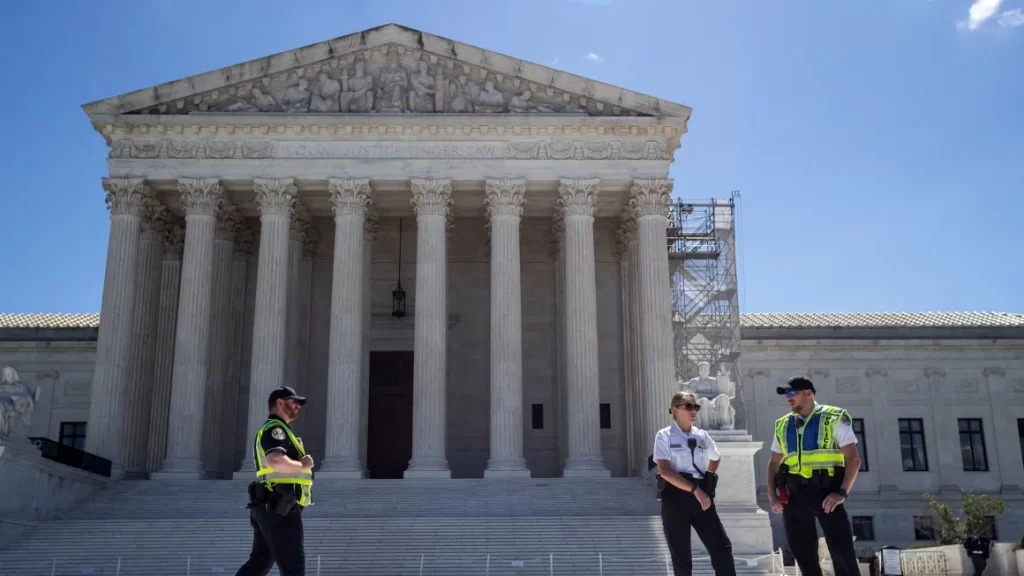Supreme Court Weighs in on Pennsylvania Voting Dispute Amid Virginia Case
3 min read
The US Supreme Court in Washington, DC. Allison Bailey/Middle East Images/AFP/Getty Images

The US Supreme Court in Washington, DC. Allison Bailey/Middle East Images/AFP/Getty Images
On Monday, the Republican National Committee (RNC) made a significant move by appealing to the U.S. Supreme Court to intervene in a contentious voting issue in Pennsylvania. This appeal comes just hours after Virginia requested the Supreme Court’s permission to continue its program aimed at removing suspected noncitizens from its voter rolls. Both cases are poised to be expedited by the Court, with the potential for swift decisions in the days leading up to the election.
The Pennsylvania appeal centers around a state court ruling that permits voters to cast provisional ballots when election officials identify issues with their mail-in ballots, specifically when these ballots are not enclosed in a required “secrecy” envelope. These ballots, lacking the necessary sleeve, are commonly referred to as “naked ballots.”
In their appeal, the RNC stressed the importance of this case, noting its potential impact on tens of thousands of votes in a state that could play a crucial role in determining control of the U.S. Senate and the outcome of the 2024 presidential election. They urged the Supreme Court to block the state court ruling, arguing that it undermines legislative authority. The RNC claimed that the Pennsylvania Supreme Court overstepped its bounds by allowing voters to correct issues with their ballots, a process the state legislature had explicitly chosen not to establish.
Justice Samuel Alito, who oversees emergency matters from Pennsylvania and other mid-Atlantic states, has requested a response to the appeal by Wednesday afternoon. The dispute originated from a lawsuit filed by two voters in Butler County, near Pittsburgh. These voters submitted mail-in ballots but failed to include them in the required secrecy envelope. When their ballots were scanned, they were flagged as defective, and the voters were subsequently informed that their votes would not count.
During the state’s primary election, these voters attempted to cast provisional ballots at their precincts, only to find that election officials denied them the opportunity, citing state law which prohibited voting after submitting a mail-in ballot, even if that ballot was deemed invalid. The Pennsylvania Supreme Court sided with the voters, stating that while the mail-in ballots were correctly discarded, the refusal to count their provisional ballots was erroneous. According to the court, Pennsylvania law mandates that provisional ballots must be counted if no other valid ballots were cast by the voters in question.
Initially, this issue involved just the voters and Butler County. However, both the RNC and the Democratic National Committee soon intervened, with the Democrats supporting the voters and the Republicans backing the county’s position. Ultimately, it is the Republican Party that has escalated the matter to the U.S. Supreme Court.
While this latest appeal adds another election-related case to the Supreme Court’s docket, its impact on the race between former President Donald Trump and Vice President Kamala Harris remains uncertain. The number of ballots potentially affected by this dispute is unclear. Legal scholar Richard Pildes from New York University estimated that the issue might concern between 400 and 4,000 ballots, though this figure is primarily focused on the secrecy envelope requirement.
Both the RNC and the American Civil Liberties Union of Pennsylvania interpret the ruling to extend beyond just the secrecy envelope issue, encompassing other technical defects in mail-in ballots, such as missing signatures or dates, that could lead to disqualification. The RNC is urging the Supreme Court to either pause the state court’s decision or separate the provisional ballots to allow for challenges after the election.
The Republicans’ appeal also leans on a legal theory known as the independent state legislature doctrine, which posits that the U.S. Constitution grants state legislatures near-absolute authority to dictate election rules. Although the Supreme Court examined this theory in a recent North Carolina case and ultimately opted not to endorse it, the Court did not entirely close the door on future considerations of state high court rulings related to election laws.
As both Pennsylvania and Virginia navigate these critical voting issues, the Supreme Court’s decisions could have lasting implications for the electoral landscape, especially as the nation gears up for a pivotal election year. The urgency and gravity of these cases underscore the ongoing legal battles surrounding voting rights and election integrity in the United States.